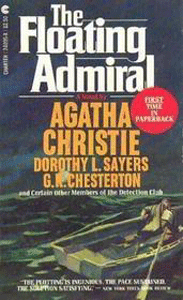“The Floating Admiral” (1931) is billed as “the most unusual mystery ever written,” and it may indeed be. It’s a “round-robin” novel. Think of it as a “choose your own adventure,” but with a string of authors choosing the plot’s direction, rather than the reader.
Too many cooks?
These 14 authors – all members of the U.K.’s Detection Club (which still exists) — are, in chronological order of their chapters: Canon Victor L. Whitechurch, G.D.H. and M. Cole, Henry Wade, Agatha Christie, John Rhode, Milward Kennedy, Dorothy L. Sayers, Ronald A. Knox, Freeman Wills Crofts, Edgar Jepson, Clemence Dane and Anthony Berkley. After reading the completed work, G.K. Chesterton then felt it needed a prologue, so he wrote one.
Readers of my Sleuthing Sunday series will be interested to know Christie’s chapter is only eight pages long. As such, “Admiral” will be of interest only to die-hard Christie completists. The book includes a “Here’s how I would’ve done it” appendix wherein Christie says she would’ve had the character of Elma be a man in disguise. This would’ve marked her most extreme case of faked identity; I wonder if Christie is putting us on with that appendix entry.

“The Floating Admiral” (1931)
Authors: Agatha Christie and 13 other members of the Detection Club
Genre: Mystery
Setting: Whynmouth, England, 1931
Judged as a mystery rather than a mere curiosity, “Admiral” is horribly convoluted. It starts with a fisherman discovering the deceased (and unfortunately named) Admiral Penistone in a rowboat at the mouth of a tidal river near the small town of Whynmouth.
The broth
The novel reflects egos more so than collaboration. Although Inspector Rudge – competent, thoughtful, methodical — is enough of a POV character to keep things readable, every author wants to add their own spin. Elements that are important to one author get lost.
At first, Rudge is his own boss. Later, he’s subservient to multiple superiors. The solicitor Mr. Dakers is pleasant enough when we meet him; later, he becomes brash under the pen of an author who prefers that he has more edge.
Early on, the fact that the admiral’s back is dry on this dewy morning is a clue; later, it’s not noteworthy. The butler Emery is a colorful character, but then he totally disappears. Every author is primarily concerned with plot, so the characters mostly stay generic, even if Whitechurch wanted fisherman Neddy Ware to be quite colorful.
Knox writes the most boring chapter, “Thirty-nine Articles of Doubt,” wherein Rudge makes a list of key points for the purposes of organizing his thoughts. But 39?! Even Poirot would find that to be too much order and method.
In the appendix, Knox is the most critical of his colleagues, practically ripping them for minimizing what he thinks is the most salient point from Whitechurch’s opening chapter: that the body is in a boat. If someone wants to cover up a murder, that’s not a good way to dispose of the body. Knox argues that the solution doesn’t satisfactorily explain why the killer(s) leaves the body in a boat.

‘Admiral’s’ legacy
As an experiment, “Admiral” might be a failure, but it’s fascinating. It’s the Club’s second round-robin work. The previous “The Scoop and Behind the Screen” (to which Christie likewise contributed) is a radio serial. Only two more round-robin books followed, in 1953 and 2016; the latter is cheekily titled “The Sinking Admiral.”
“Admiral” marks Christie’s only collaborative novel. Although this single work is too small of a sample size, my impression is that the round-robin approach doesn’t lead to good novels. “Admiral” is sorely missing a singular focus.
Modern entertainment connoisseurs can compare it to a long-running TV series that has a lot of turnover in the writers’ room. Important plot elements and character traits in early episodes are forgotten. TV shows thus go off the rails. (Along that line, a railroad line is important to several “Admiral” writers in the appendix, but it ends up being irrelevant to the plot.)
“The Floating Admiral” doesn’t precisely have plot holes. Everything that happens could have happened. But by the end – even though Berkley writes a dramatic final scene — it’s an exercise in getting everything to fit. There’s no theme or memorable characters. The parts are greater than the sum.
Sleuthing Sunday reviews an Agatha Christie book or adaptation. Click here to visit our Agatha Christie Zone.

